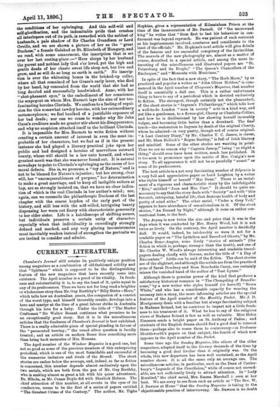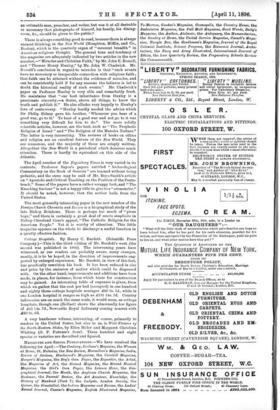CURRENT LITERATURE.
Chambers's Journal still retains its positively unique position among magazines as a combination of old-fashioned solidity and that "lightness" which is supposed to be the distinguishing feature of the new magazines that have recently come into existence. The April number is a proof of its vitality. In fresh- ness and substantiality it is, to say the least of it, quite equal to any of its predecessors. Thus we have not for long read a brighter or wholesomer story than Mr. Guy Boothby's " Billy Binks —Hero," which tells how an Australian gamin, the companion of a convict of the worst type, and himself incurably erratic, develops into a hero and martyr at the time of a great labour strike in Australia through his love for a baby. Under the title of "The Master Craftsman" Sir Walter Besant continues what promises to be an exceptionally good story. But it is in the miscellaneous articles that the freshness of Chambers's Journal is best exhibited. There is a really admirable piece of special pleading in favour of the "persecuted herring ; " the vexed silver question is lucidly treated ; and an article on modern Rome does something more than bring back memories of Mrs. Hemans.
The April number of the Windsor Magazine is a good one, but not so good as some of the previous numbers of this enterprising periodical, which is one of the most formidable and successful of the numerous imitators and rivals of the Strand. The short stories are rather below the average, and, indeed, so far as fiction is concerned, this number depends almost exclusively upon the two serials, which are both from the pen of Mr. Guy Boothby, who is making almost as great a hit with his queer adventurer, Dr. Nikola, as Mr. Conan Doyle did with Sherlock Holmes. The chief attraction of this number, at all events in the eyes of its conduct-us, seems to be the first of a series of papers entitled "The Greatest Crime of the Century." The author, Mr. Tighe Hopkins, gives a representation of Kilmainham Prison at the time of the incarceration of Mr. Parnell. Of "the uncrowned king" he writes that "from first to last his behaviour in con- finement was beyond reproach. He was patient of such restraint as his imprisonment involved, courteous and considerate to the least of the officials." Mr. Hopkins's next article will give details of the famous and too successful conspiracy of the Invincibles. The marvels of the new photography are, almost as a matter of course, described in a special article, and among the more in- teresting of the miscellaneous and illustrated papers are "St. Petersburg and its People," "The Queen's Chancellors of the Exchequer," and "Moments with Musicians."
In spite of the fact that a new story," The Herb-Moon," by so practised and popular a writer as "John Oliver Hobbes," is com- menced in the April number of Chapman's Magazine, that number
itself is essentially a dull one. This is a rather unfortunate thing to have to say of a periodical which is devoted exclusively to fiction. The strongest, though certainly not the pleasantest,
of the short stories is " Ingram's Philanthropy," which tells bow a well-to-do London "man in society" acts in a kind way, and
yet like a gentleman, to a flower-girl. Cherry or Charlotte Collins, and how he is disillusioned by her showing herself incurably vulgar, and becoming little better than a drunkard. The final touch—the restoration to Ingram by death of the original Cherry, whom he admired—is very pretty, though not of course original.
"A Last Century Diary," by Mr. Charles T. C. James, is clever, and Mr. Shan Bullock's "Rogue Bartley," is full of Irish blarney and mischief. Some of the other stories aro wanting in point.
Thus we see no reason why "Captain Jessop," being "so slight a thing," should ever have been written, much less published. It is too soon to pronounce upon the merits of Mrs. Craigie's new story. To all appearance it will not be so painfully " smart " as some of its predecessors.
The best article in a not very fascinating number of Belgravia is a very full and appreciative paper on Lord Leighton by a writer who styles himself or herself " Mai Dean." There is an instal- ment of a vigorous and characteristic story by the indefatigable "Rita," entitled "Joan and Mrs. Carr." It should be quite un- necessary to say that the story deals with" Society" and with "this feverish, intriguing, hateful life, that destroys health of body and purity of mind alike." The other serial, " Under a Grey Veil," appears to have abundance of sensationalism in it. Of the short stories, "An Errand by Night," although it runs on rather con- ventional lines, is the best.
The Argosy is now twice the size and price that it was in the days when it was conducted by Mrs. Henry Wood, but it is not
twice as lively. On the contrary, the April number is decidedly
dull. It would, indeed, be intolerably so were it not for a readable paper on "The Lyttelton and Beresford Ghosts," by Mr.
Charles Brucc-Angier, some lively "stories of animals" (the fiction in which is, perhaps, stranger than the truth), and one of Mr. Charles W. Wood's always interesting and readable travel- papers dealing chiefly with Gerona, under the title of "A Day of Encounters." Little can be said of the fiction. The short stories are of the slightest, and although the serials are from the practised pens of Sarah Doudney and Ross. Nouchette Carey, one certainly misses the vanished hand of the author of "East Lynne."
Although there is genuine power of the kind that produces a satisfactory historical romance in "The Changeling of Brendle-
some," by a new writer who styles himself (or herself) "Roma White," and who has a considerable capacity for weaving the uncanny into a story, the more informing articles are the special
feature of the April number of the Monthly Packet. Mr. J. D.
Montgomery deals with a familiar but always fascinating subject in Madame Roland, but he contrives to impart not a little fresh-
ness to his treatment of it. What he has to say of the religious views of Madame Roland is fair as well as valuable. Miss Helen Zimmern sends a bright paper on St. Anthony of Padua ; and
students of the English drama should find a good deal to interest them—perhaps also to rouse them to controversy—in Professor Shuttleworth's papers on that subject, the fourth of which now appears in the April number of the Packet.
Some time ago the Sunday Magazine, like others of the older magazines, adapted itself to the literary demands of the time by
becoming a good deal livelier than it originally was. On the whole, this new departure has been well sustained, as the April number shows. It is all the same only an average one. The
miscellaneous articles, in particular, such as the Dean of Canter. bury's "Legends of the Crucifixion," while of course not unread- able, are not sufficiently lively to attract attention. In "Lady Rosalind," the chief serial, Mrs. Emma Marshall ir seen at her best. We are sorry to see from such an article as "The Rev. W. J. Dawson at Home" that the Sunday Magazine is taking to the objectionable practice of interviewing. Mr. Dawson is no doubt
an estimable man, preacher, and writer, but was it at all desirable or necessary that photographs of himself, his family, his dining- room, &c., should be given to the public?
There is always something good to read, because there is always earnest thinking, in the New World (Houghton, Mifflin, and Co., Boston), which is the quarterly organ of "reverent breadth" in American religious thought. The general tone and tendency of the magazine are adequately indicated by two articles in the new number,—" Miracles and Christian Faith," by Mr. John E. Russell, and "Thomas Henry Huxley," by Mr. John W. Chadwick. Mr. Russell's conclusion in regard to miracles is that "such events have no necessary or inseparable connection with religious faith ; that faith can be attained without the evidence of miracles, and can be consistently held if for any reasons the believer is led to doubt the historical reality of such events." Mr. Chadwick's paper on Professor Huxley is very able and remarkably fresh. He maintains that our best inheritance from Huxley is a passionate sincerity,—a desire, above all things, to know the truth and publish it." He also alludes very happily to Huxley's love of controversy. "Huxley hardly needed the advice which Sir Philip Sidney gave his brother, 'Whenever you hear of a good war, go to it.' To hear of a good war and not go to it was something very difficult for him to do." The more solidly scientific articles, however, are the best, such as "The Prophetic Religion of Israel" and "The Religion of the Manehu Tartars." The latter is very interesting. The reviews of books on ethics and religion are an excellent feature of the New Work!. They are numerous, and the majority of them are crisply written. Altogether the New World is a periodical which deserves much attention. There is hardly its equivalent on this side of the Atlantic.
The April number of the Expository Times is very varied in its contents. Professor Sayce's papers entitled " .Archmological Commentary on the Book of Genesis" are learned without being pedantic, and the same may be said of Mr. Boys-Smith's article on "Apostolic and Critical Teaching on the Position of the Penta- teuch." Some of the papers have a rather scrappy look, and "The Knocking Saviour" is not a happy title to give to a" sermonette." It should be noted, however, that the author hails from the United States.
The most generally interesting paper in the new number of the Foreign Church Chronicle and Review is a biographical study of the late Bishop Reinkens. There is perhaps too much of "pious hope," and there is certainly a great deal of sancta simplicita in Bishop Cleveland Coxe's appeal, "The Catholic Religion for the American People." Yet it is worthy of attention. This little magazine appears on the whole to discharge a useful function in a quietly effective fashion.



































 Previous page
Previous page